Pro-life
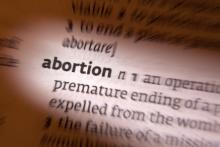
The number of abortions nationwide has declined by about 12 percent in the last 5 years, according to the Associated Press. States with the strongest restrictions to abortion access and states with the least show a similar decline in rates.
"Explanations vary," the Associated Press reports, with one factor being a decline in the teen pregnancy rate. Depending on which side of the abortion debate you lie, you can find advocates who attribute the overall decline in abortions to either better sex education and access to contracepton — or advanced technology and a new generation of women for whom there is "an increased awareness of the humanity of the baby before it is born."
From the AP:
"Abortion-rights advocates attribute it to expanded access to effective contraceptives and a drop in unintended pregnancies. Some foes of abortion say there has been a shift in societal attitudes, with more women choosing to carry their pregnancies to term.
Several of the states that have been most aggressive in passing anti-abortion laws — including Indiana, Missouri, Ohio, and Oklahoma — have seen their abortion numbers drop by more than 15 percent since 2010. But more liberal states such as New York, Washington and Oregon also had declines of that magnitude, even as they maintained unrestricted access to abortion."
Public Religion Research Institute, a public opinion research group in Washington, D.C., has created an interactive atlas of American values and hot-button social issues. See where your state lands on attitudes over the availability and legality of abortion here.
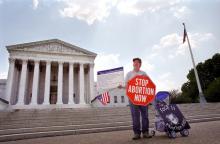
Despite Americans’ shifting opinions on a range of moral and ethical issues, abortion foes have been encouraged by numbers showing that opposition to abortion rights appeared to have resisted serious slippage, and was even gaining traction.
But a Gallup poll released May 29 shows that may be changing: 50 percent of all Americans now identify as “pro-choice,” the first statistically significant lead over the “pro-life” label, which came in at 44 percent, since 2008.
The data suggest this could signal an end to the seesaw battle that has characterized opinions on abortion over the past few years.

How refreshing to see Roman Catholic Archbishop Thomas Wenski’s May 29 letter to EPA Administrator Gina McCarthy urging that the new carbon pollution rules on existing power plants should “protect the health and welfare of all people, especially children, the elderly, as well as poor and vulnerable communities from harmful pollution emitted from power plants and from the impacts of climate change.” The Miami archbishop was speaking on behalf of the U.S. bishops in his role as chairman of the U.S. bishop’s Committee on Domestic Justice and Human Development.
Since last Monday and even in the months leading up to the release of the new EPA rules governing carbon pollution, there’s been a battle royale in the media and the blogosphere between the fossil fuel industry (and their supporters) and the environmentalists (and their proxies).
THE LEADERSHIP of 12Stone Church, a multi-campus congregation based in Gwinnett County, Ga., became increasingly concerned about how home foreclosures, rampant unemployment, and other financial strains were impacting families in metro Atlanta. They set an ambitious goal of providing relief to 5,000 families in their church and community. Eventually they raised more than $550,000 through designated gifts, many from church members who were themselves unemployed.
Partnering with the HoneyBaked Ham Company, Kroger grocery stores, and other area sponsors, the 12Stone Church members distributed food to needy families, culminating with a day of giveaways in the parking lot of Coolray Field, home to the Gwinnett Braves, the local minor league baseball team. People began lining up hours before the event, jamming traffic on nearby I-85. Others slept in their cars overnight to keep from missing out.
Imago Dei Church in Raleigh, N.C., has mercy ministries built into the DNA of the church. They’ve adapted Rick Warren’s PEACE Plan: plant churches, evangelize the world, aid the poor and sick, care for the orphan and the oppressed, and equip leaders.
Working through the Raleigh-based nonprofit Help One Now, Imago Dei is partnering with an orphanage in Haiti and sponsoring children. Through this ministry, the church is providing basic needs, including food, clean water, and health care. They also support education programs so that the children will be equipped to one day provide for their own families.

Now that the trial for abortion provider Kermit Gosnell has ended with a conviction, many are asking what public officials in Philadelphia plan to do with the 47 bodies from the case.
After Gosnell’s arrest in 2011, then-Archbishop Cardinal Justin Rigali asked the district attorney’s office for the bodies of the aborted fetuses. The bodies were being retained for the trial, but after it ended and Gosnell was sentenced to life in prison, his successor, Archbishop Charles Chaput, has renewed the request to bury the bodies.
Francis Maier, special assistant to Chaput, said that he doesn’t know whether or not a service would include a Catholic Mass, but he said it would be quiet and dignified.
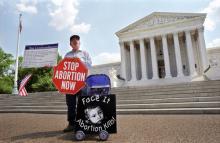
Even before rogue abortionist Kermit Gosnell was convicted in Philadelphia on Monday of delivering and then killing late-term infants, abortion opponents were convinced they had a case that could reshape an abortion debate that has remained static over the years.
After the verdict, they were even more confident.
“Dr. Gosnell is only the front man; and the real trial has only just begun. The defendant is the abortion license in America,” Robert P. George, a Princeton law professor and leading conservative activist, wrote after a jury convicted Gosnell of three counts of first-degree murder for snipping the spines of babies after botched abortions.
Gosnell, who could face the death penalty, was also found guilty of involuntary manslaughter in the death of a 41-year-old patient who sought an abortion at the squalid West Philadelphia clinic that prosecutors labeled a “house of horrors.”
Yet the fervent prayers for a game-changing impact from the Gosnell conviction may go unanswered for a variety of reasons.

American anti-abortion leaders will be in Rome on Sunday to participate in Italy’s third March for Life and lend their expertise to the nation’s small anti-abortion movement as it tries to learn from its American counterpart.
Jeanne Monahan, president of the March for Life Education and Defense Fund, and Lila Rose of Live Action will be among those who will march through central Rome on Sunday morning, from the Colosseum up to Castel Sant’Angelo, a few hundred meters from the Vatican.
While the annual March for Life in Washington — which celebrated its 40th anniversary in January — attracts hundreds of thousands of people and heavy media coverage, in Europe anti-abortion movements have often kept a lower profile and haven’t been able to shape social discourse as in the United States.
Polls regularly show high levels of support for abortion rights throughout Europe. A January poll by Eurispes found that 64 percent of Italians favor legalizing abortion pills.
In Italy, abortion is currently legal in hospitals up to the third month of pregnancy.

C.S. Lewis described himself as a dinosaur as he lived in a cultural landscape that seemed to change before his eyes.
I don’t feel like a dinosaur, but I do feel like a disembodied voice crying in the wilderness as I struggle, like a fish swimming upstream, to believe that the Gospel is real and solid and still matters.
It’s not that cynics and agnostics have convincing arguments – though some do.
And it’s not as if Faith itself has lost its power and edge – because it hasn’t.
Perhaps it’s true in every age, but it certainly seems more true now, that many of those who call themselves believers, believe and live as if they believe a different Gospel altogether.
The contradiction is so thorough, it must be deliberate.
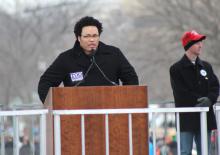
WASHINGTON — Standing before the throngs at the March for Life on Jan. 25, Ryan Bomberger admitted that he was the poster child for one of the most difficult aspects of the abortion debate: his mother had been raped.
“I’m the fringe case that even pro-lifers have a hard time embracing,” said Bomberger, an anti-abortion activist whose mother chose to continue the pregnancy and put him up for adoption.
Forty years after the Roe v. Wade decision legalized abortion, children who were conceived through rape — and women who were raped and chose to end the pregnancy — are speaking out, opening a new front in the often-fraught discussions of a decades-old culture war.
When thousands of abortion opponents gather Friday on the National Mall for their annual protest march, they will be united in their fierce passion for ending a procedure that the Supreme Court legalized 40 years ago in the controversial Roe v. Wade decision.
But they will also be more divided than ever on how best to rally people to join their cause: shock them with harsh slogans and graphic images of mangled fetuses, or convince them with reasonable arguments and affecting ultrasound images.
If activists are going to the March for Life “to display graphic photos or videos of aborted babies,” Simcha Fisher wrote this week in the National Catholic Register, a conservative outlet, “I’m begging you to reconsider.”
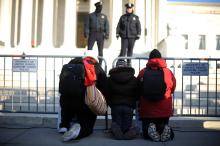
This is a memorable week: on Monday the inauguration of President Obama on the holiday honoring Martin Luther King, Jr., and today, the 40th anniversary of the Roe v. Wade decision by the Supreme Court. Some people will celebrate all three with thanksgiving. Others will find nothing to celebrate – especially the decision of January 22, 1973 that struck down state laws banning abortion.
Another Inaugural Address
On Sunday, there will be another inaugural address – this one by Jesus at the beginning of his ministry (Luke 4: 14-21). After 40 days in the wilderness facing the devil, Jesus returned to his hometown of Nazareth and went to the synagogue. He took his place at the reading desk and someone handed him the scroll of Isaiah. The text says he “found the place where it was written.” Jesus read the text, handed the scroll back to the attendant and sat down. Everyone was looking at him – all those hometown folks who knew him as a child. Then Jesus said, “Today, this scripture has been fulfilled in your hearing.” That must have been a shock because the Isaiah text Jesus read proclaims more than anyone could see: good news to the poor, release to the captive, recovery of sight to the blind, freedom for the oppressed – and the year of the Lord’s favor. The hometown folks would have recognized the year of Jubilee when debts would be cancelled, slaves set free and the land allowed to rest. Jesus was making a very big claim!
How shall we interpret what Jesus said in light of our deep divisions over abortion? Is the fetus in the womb oppressed or is the pregnant woman denied choices oppressed? Is the woman captive to laws that restrict her access not only to abortion but to contraceptives? Or is the fetus a captive threatened with death? We have grown so accustomed to shouting slogans at one another that it has become almost impossible to have faithful conversations across our differences.
Four decades after Roe v. Wade, the landmark Supreme Court ruling that legalized abortion, many opponents of the decision are in a celebratory mood while those backing abortion rights are glum, feeling that momentum is turning decisively against them.
Yet in reality, little has changed in the fiercest and most protracted battle of the nation’s bitter culture war.
Instead, what’s really going on is a case study in the psychology of movement politics, where activists have to rally supporters with cries of alarm without making them despair that all is lost. At the same time, they must offer evidence that their efforts are paying off without leaving them complacent.
It’s a difficult balancing act, and lately the abortion rights camp has been the one to sound the warnings.
Recently Russell Moore, dean of the School of Theology at Southern Baptist Theological Seminary, talked with Religion News Service about why more evangelicals should adopt.
Moore states:
At the level of the common good, this is something that all people should be concerned about. But it’s consistent for evangelical Christians to be pro-orphan.
What most churches want, when they start to think about this issue, is a preprogrammed initiative, a set of instructions. I don’t think this issue works that way. It has to be organic. It has to be flexible. It has to create a culture within a congregation.
It will be congregational cultures that start to change with the inclusion of the families who are adopting and fostering and caring for orphans. I think that’s a long-term project over a generation, not something short-term.
Read more here.
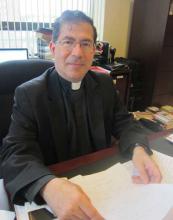
NEW YORK — A year ago, the Rev. Frank Pavone was facing an existential crisis in the unlikeliest of places.
The longtime head of the anti-abortion group Priests for Life, Pavone had been confined to the Diocese of Amarillo by his bishop, Patrick J. Zurek, who sent a letter to every other U.S. bishop declaring that he had so many concerns about the group’s $10 million budget that Pavone shouldn’t be trusted with donors’ money.
Pavone’s backers were stunned, and many stopped giving, which only exacerbated the problems that helped get Priests for Life into trouble in the first place. Pavone also couldn’t go on the road to reassure funders and drum up desperately needed cash.
Instead, the New York-born priest was stuck in a convent in the Texas panhandle where he served as chaplain to an order of nuns in a place called Prayer Town, a virtual prisoner in a war of words with Zurek, who had blasted his “incorrigible defiance of my legitimate authority as his bishop.”
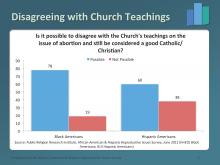
The influence of clergy in swaying their congregants' attitudes about moral issues like abortion and contraception access is dwindling, according to a new study.
The Religion, Values, and Experiences: Black and Hispanic American Attitudes on Abortion and Reproductive Issues survey, conducted by the Public Religion Research Institute, shows that there continues to be a disconnect in personal, moral belief and feelings about public policy.
"What they're hearing at church is not the big mover on attitudes of legality of abortion," Robert Jones, PRRI CEO, said.
While 51 percent of black Americans believe abortion is morally wrong, 67 percent say it should be legal in all or most cases.
"I really think that freedom of choice is probably one of the most precious components of what it means to be a Christian. Blacks have been quite possessive and reflective of this fact," said Dr. Stacy Floyd-Thomas, associate professor of Ethics and Society at Vanderbilt University's Divinity School. "… You do have the majority saying that they might see it as a sin or they are against it, but you still have the right."
Both groups believe it is possible to disagree with church teaching and be a good Catholic or good Christian. Jones pointed to the growing trend of personal versus external focus. Previous surveys have shown that attitudes about religion are mostly influenced by people's own beliefs and behaviors rather than institutional doctrine.

I had a veteran friend once tell me, “The biggest lie I have ever been told is that violence is evil, except in war.” He went on, “My government told me that. My Church told me that. My family told me that. … I came back from war and told them the truth—‘Violence is not evil, except in war… Violence is evil – period.’”
Every day it seems like we are bombarded with news stories of violence—a shooting in Colorado, a bus bombing in Bulgaria, drones gone bad and the threat of a nuclear Iran, a civil war in Syria, explosions in Afghanistan and Iraq.
The recent cover story of Time magazine was "One a Day," showing that soldier suicides are up to one per day, surpassing the number of soldiers who die in combat. The U.S. military budget is still rising—more than $20,000 a second, more than $1 million a minute, spent on war even as the country goes bankrupt.
Our world is filled with violence—like a plague, an infection, a pandemic of people killing people, and people killing themselves. In my city of brotherly love, Philadelphia, we have nearly one homicide a day—and in this land of the free we have more than 10,000 homicides per year.
This week President Barack Obama called the shooting in Colorado “evil.” And he is right.
But perhaps it is also time that we declare that violence is evil, everywhere—period. It’s obvious that killing folks in a movie theater is sick and deranged, but the question arises: is violence ever okay?

As a Pro-Life Catholic Mother of three beautiful children, I was surprised by the joint statement released by The Cornwall Alliance about the Rev. Mitch Hescox and the Evangelical Environmental Network's mercury campaign. I was shocked when the Cornwall Alliance joint statement declared the definition of Pro-Life as merely an "opposition to a procedure that intentionally results in dead babies."
I am an ardent Pro-Life and Children's Environmental Health Advocate. In the Cornwall Alliance statement they note that "most environmental causes promoted as pro-life involve little threat to human life itself, and no intent to kill anyone." I have spent the 6.5 years researching environmental toxins and their impact on our born and unborn Children's health. The toxic environmental exposures, like mercury, are directly linked to many life ending, life threatening or life altering diseases in our children.
“Life, especially protecting our unborn children and infants, should not be a ‘matter of party or economic commodity.’ Protecting life and providing the opportunity for abundant life must be a matter of principal and morality.” – The Rev. Mitch Hescox, delivering a testimony on “A Christian Perspective on the Costs of Mercury to Human Health and Wellbeing” before the Energy and Power Subcommittee for the House of Representatives.

A fascinating new study by the Public Religion Research Institute found that two-thirds of all Americans identify with both the "pro-life" and "pro-choice" labels simultaneously.
The PRRI reports that 7-in-10 Americans say the term “pro-choice” describes them "somewhat" or "very well," and nearly two-thirds simultaneously say the term “pro-life” describes them "somewhat" or "very well."
"This overlapping identity is present in virtually every demographic group," the report said.
In one of the largest public opinoin surveys ever conducted on the subject of abortion and religion, PRRI's study, "Millennials, Abortion and Religion Survey," uncovered "large generational differences on two issues that have often been linked in political discourse: abortion and same-sex marriage."
According to the survey, Americans ages 18-29 (a.k.a., "Millennials") strongly support legal access to abortion services in their local communities despite being conflicted about the morality of abortion itself.
The U.S. Conference of Catholic Bishops (USCCB) released a letter to Congress on Monday concerning unemployment benefits. Bishop Stephen E. Blaire of Toledo, Ohio, the letter's signatory, makes the argument that unemployment benefits are a “right to life” or pro-life issue.
This is a time of “prolonged and pervasive economic pain.” The letter cites the median length of joblessness as 10 months and that there are 4 job seekers for every 1 job opening. Blaire then quotes from Pope John Paul II’s encyclical Laborem Exercens:
The obligation to provide unemployment benefits, that is to say, the duty to make suitable grants indispensable for the subsistence of unemployed workers and their families, is a duty springing from the fundamental principle of . . . the right to life and subsistence.
If Glenn Beck still had that black board, Pope John Paul II might end up receiving the posthumous honor of having a smiling photo added to it.